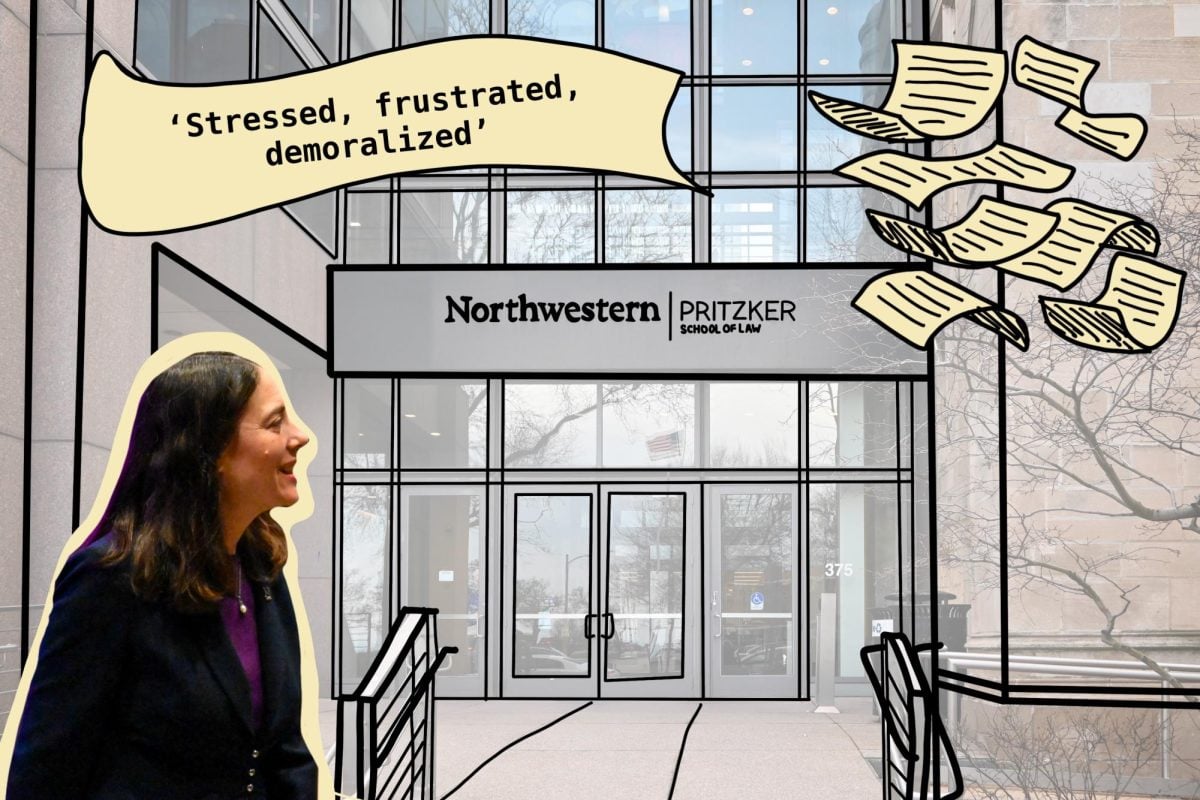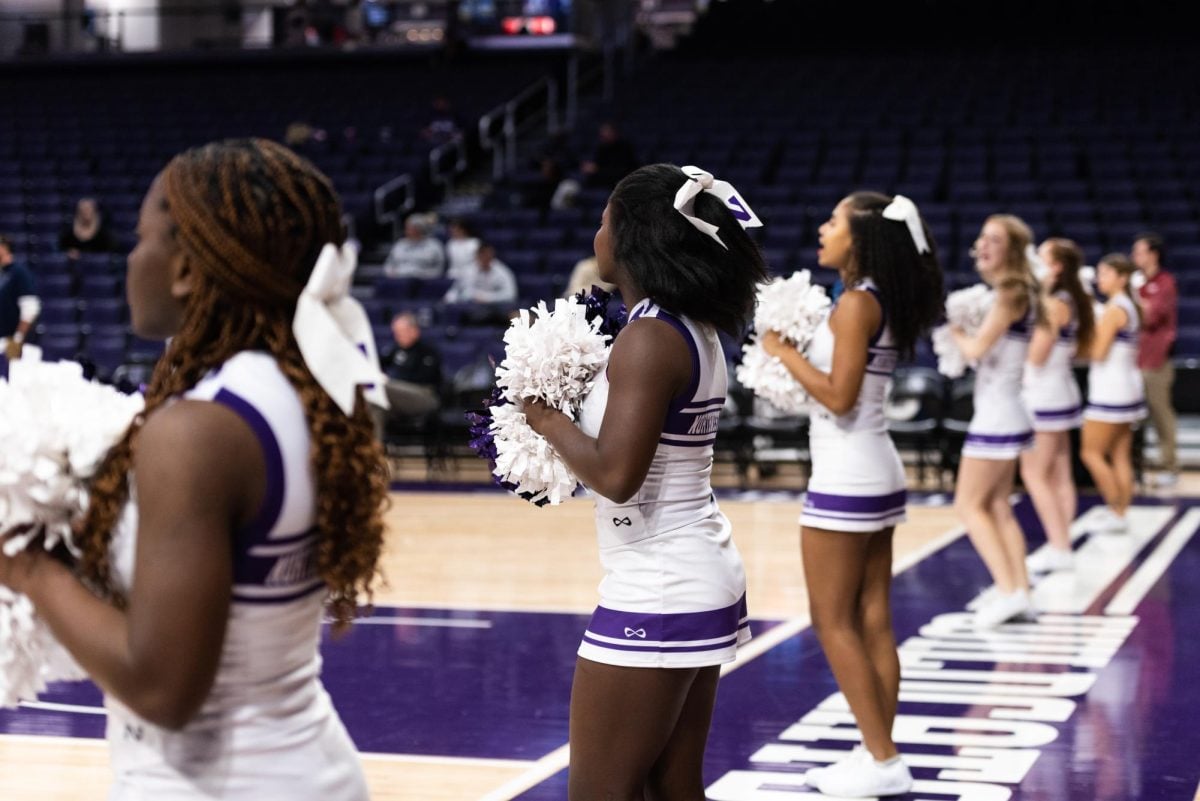Greek life at Northwestern may be exclusive in more ways than one.
But the University administration is working to change that by pushing to make fraternities and sororities more accessible to NU students with physical disabilities. The Greek organizations are on board with the plan in principle, but most have yet to make necessary upgrades like accessible ramps, elevators and widened showers. The improvements are expected to come within the next few years but could be held up by a predictable hurdle: their multimillion dollar cost.
Currently only four of the 29 Greek houses on NU’s campus are fully accessible to students with mobility impairments. The others, many of which were built decades ago, lack basic components that would make living in them possible for students with disabilities.
But that might soon change due to a law originally passed more than 20 years ago. The Americans with Disabilities Act, established in 1990, requires all public buildings – including those at private institutions of higher education like NU – to provide accessibility to those with mobility issues. The NU administration has been asking fraternities and sororities to make their houses comply with that law and is starting to get serious about enforcement.
“They know who they are, and they know the clock is ticking,” said Bill Banis, vice president for student affairs. “If they’re not going to be compliant with the terms of their lease, then the University is going to have to determine if they are viable for remaining at Northwestern.”
In the next few years, NU’s Panhellenic Association and Interfraternity Council chapters will launch expensive renovation projects to make each of their houses accessible to any potential future members who may have mobility impairments. More than $30 million may be spent even if not a single mobility-impaired student goes Greek. And although the plans are being overseen by the administration, the University won’t be paying a cent of the costs for most of the houses.
In order to be considered ADA-compliant, a fraternity or sorority chapter must provide wheelchair access to its common areas as well as at least one bedroom and bathroom. For most of NU’s Greek chapters, this means reconfiguring rooms, building ramps and adding elevators to allow for entry to areas like dining and chapter rooms – renovations which could cost upward of $1 million per house.
Only about five percent of the 500 undergraduate, graduate and professional students served by her office have disabilities that are readily visible, said Alison May, the assistant director of NU’s Office of Services for Students with Disabilities. The office does not track how many of those students are mobility-impaired.
This means that at most 25 NU students have mobility impairments, including graduate and professional students. The number of undergraduates who would benefit from accessibility renovations to Greek houses is likely even lower, leading some to question whether the high costs of upgrades are even worth it.
“There’s this hypothetical situation that someone wants to join a fraternity and needs accommodations. And this hypothetical person is someone that you probably won’t find,” said alumnus Cody Kittle (Weinberg ’10), who served as the president of Sigma Phi Epsilon last year and is a former Daily columnist.
But for administrators like Sheila Driscoll, director of business and finance for Student Affairs, the numbers don’t really matter.
“Even if there’s just one person, the buildings need to be accessible,” Driscoll said.
There is no firm deadline for compliance prescribed by ADA. But the University, which leases the houses to the chapters, has made it clear that they want all PHA and IFC organizations to upgrade their facilitates to meet guidelines by the time their leases comes up for renewal.
Should a chapter fail to comply, the University has the legal option to terminate the lease. The terms of each chapter’s lease differ, but several houses have leases up for renewal in the next three years. These houses will be the first to either meet the requirements or test the administration’s resolve.
A work in progress
The University received a lot of resistance when it first approached Greek chapters on the issue of accessibility about a decade ago.
Many of the chapters’ house corporation boards believed the University should be responsible for the costs since the houses are University property and the chapters are simply tenants, Banis said. But the administration felt differently, largely because chapters are not paying rent to the University but are receiving members’ room and board payments, he said.
“You can’t have it both ways. You can’t have the ability to be generating revenue on University property if you’re not going to be paying for the maintenance and the upgrades of the buildings,” Banis said.
In January 2003, when Kappa Delta extended a bid to a student using a wheelchair, the University became even more determined to go forth with its plan.
The parties reached a compromise after nearly three years of negotiations. Under the compromise, houses could “opt in” – allowing the University to collect the revenue from room and board payments, take care of maintenance and make capital renovations like adding accessibility ramps. Or they could “opt out” – collecting their own revenue but also taking responsibility for all the maintenance and renovations required by the law and the University.
Even under the terms of this compromise, many Greek leaders said they are concerned about the high costs for the improvements. Cost assessments for an elevator at Sig Ep, which has its chapter room on the fourth floor, came out to be around $300,000, Kittle said. The chapter is still figuring out whether it will be cheaper to install the elevator or move its chapter room to a lower-level floor.
The administration admits the renovations will not be cheap. Banis estimated upgrades will cost around $1.5 million per house. In order for houses to accommodate the ADA additions, many chapters will have to rebuild significant parts of their houses.
Dartmouth College in Hanover, N.H., which is finishing up ADA accessibility renovations for its Greek houses, cited similar costs of $1 million to $1.5 million for each house. While the campus currently has only one student who uses a wheelchair, most of the Greek houses accepted the need for accessibility renovations because it “felt like it was the right thing to do,” said Woody Eckels, Dartmouth’s director of residential operations.
The circumstances at Dartmouth are slightly different. Seven of its houses are college-owned and operated, and their renovations were paid for by the college. For its 17 privately-owned houses, Dartmouth set up an $8 million fund so those houses could borrow the money they needed for renovations at interest rates much lower than those available at banks and other lending institutions.
“The vast majority of our houses were grateful the money was at least an option for them,” Eckels said.
No such aid is offered by NU, meaning each chapter has to either raise its own capital for renovations or borrow from banks. Nevertheless, most chapters chose to opt out. Only Alpha Epsilon Pi, Phi Delta Theta and Zeta Tau Alpha opted in and fall under University maintenance. Phi Mu Alpha Sinfonia, which joined the Interfraternity Council this year, is not subject to the opt in/opt out policy because its house is operated by the University, like a dorm.
While NU has no plans to offer financial assistance for improvements the way Dartmouth does, the University still expects all chapters to become ADA-compliant by the end of their 10-year leases. Because those leases were signed at different times, the expiration dates vary for each house.
Driscoll said the ADA accessibility renovations are not simply an arbitrary mandate from NU. Rather, compliance is required by federal la
w and by the terms of each chapter’s housing lease.
“We’re not in the business of threatening,” Driscoll said. “We want to work with them to implement what they need for the students.”
Still, the houses are feeling the pressure from the University, said Kelly Brest van Kampen, president of the Quadrangles, an organization comprising the house corporation boards of NU’s IFC and PHA chapters.
“The houses have approached this individually,” she said. “However, the consensus now is this is a new rule that is extremely important and it’s going to happen. Period.”
Private, but also public
Greek houses walk a delicate line with regard to ADA accessibility.
Under Title III of the act, Greek houses may be defined as a “private club” and thus be exempt from the requirements. Fraternities and sororities have highly selective membership recruitment processes, charge substantial membership fees and are governed by the local chapter and its national headquarters, thus meeting three of the commonly cited definitions of a private club.
In practice, these provisions mean Greek houses at schools like the University of Missouri, where the houses are not owned or operated by the university, have the option to forgo complying with ADA regulations.
This is not the case at NU.
“The fact that the University owns the land would certainly count in favor of coverage,” said Mark Weber, a DePaul University College of Law professor and author of “Understanding Disability Law.”
Since NU owns all of the Greek houses on campus and the University is not exempt from the law, the administration can ask chapters to meet the terms of the act.
The University itself has also made ADA accessibility provisions in several buildings, such as the newly renovated Harris Hall and Rogers House, and plans to make the entire campus accessible in the long run, Banis said.
Coming soon to Greek quads: Full accessibility
Currently University Housing provides temporary ramps to chapters that need them during recruitment. The 2011 recruitment season didn’t see any such requests, Driscoll wrote in an e-mail.
Dominic Greene, the director of the Office of Fraternity and Sorority Life, said to his knowledge, there haven’t been any ramp requests during the five formal PHA and IFC recruitment periods since he has worked at NU.
The upcoming renovations will obliterate any need for ramps from University Housing. However, most of the chapters have yet to meet all the requirements.
KD, which acted in 2003 to accommodate its wheelchair-using initiate, built a ramp leading up to the front door, renovated a bedroom and a bathroom downstairs and installed a lift that could take the member to the chapter room downstairs. Other than KD, only Phi Delt and Chi Psi are fully accessible, Greene confirmed.
Evans Scholars, the merit-based scholarship program for golf caddies, also has an ADA-compliant house. The organization, which is part of IFC but does not conduct formal recruitment like other Greek houses, is a unique case. Improvements for their house, which underwent a $5 million renovation last summer, were paid for by the Western Golf Association, its national governing body.
Some other houses have approached their required renovations step-by-step. Sigma Chi installed an elevator, and Alpha Phi put in a ramp in addition to its accessible bedrooms and bathrooms. Several others have set plans in motion, contacting architects and drawing up blueprints. Neighboring sororities Delta Delta Delta and Alpha Chi Omega, for example, plan to build a shared ramp this summer.
Even after the individual chapters have had architects sketch out plans, they must receive approval from Facilities Management to ensure quality before any construction can begin.
“Since it’s our property, we have to approve all the plans so they don’t just call Joe’s Plumbing and Electrical Services to come in and do something on the fly,” Banis said. “Student safety is paramount. We’re not going to be taking shortcuts just to save a few bucks.”
The Greek community responds
Since the opt in/opt out compromise took effect, some in the Greek community have come to better understand and accept the University’s accessibility mandate and the positive impact it could make.
“We don’t want anyone to feel like they can’t go Greek, especially because of a physical handicap,” said Mike Markese, the president of Sigma Alpha Epsilon. “So it’s something that we’re not just considering but something we’re expecting to execute.”
Kittle is less inclined to embrace the ADA improvements. He said while the policy is well-intended and politically correct, the end results may be wasteful and have little impact.
“It’s like putting 100 handicapped parking spots in front of an ice skating rink,” he said. “The end result is that the rink closes down because no one goes.”
Gabriella Garbero, a Kappa Kappa Gamma member at the University of Missouri, adamantly disagreed.
“Allowing disabled people to participate in Greek recruitment will not prevent anybody else from going through Greek recruitment,” said Garbero, who in 2009 was the first woman to go through recruitment in a wheelchair at her school. “It’s also implying that joining a Greek house is not something disabled people do. It’s saying that disabled people shouldn’t even go through recruitment because it’s only for able-bodied people.”
She said she believed more students with disabilities would apply to NU if the school made itself more accessible.
Accessibility comes with additional benefits, advocates said.
Having accommodations in place will be beneficial when alumni visit on special occasions like Homecoming and if a member gets injured and requires a wheelchair temporarily or permanently, Greek leaders said.
“I think people realize the importance of it, and it’s something the University wants to happen,” Markese said. “Being Greek is being part of the University, and it’s something you have to comply with.”
Banis, who is retiring this year but has overseen the accessibility push since its inception, believes the Greek housing corporations will act in good faith and cooperate with the University.
“What do we have in common? The well-being and safety of our students,” Banis said. “And that’s a good place to start.”
Full disclosure: Rowena Li is a member of Alpha Chi Omega.







